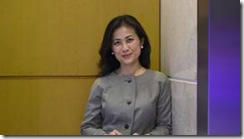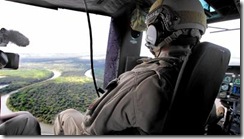Sau 30 năm…một thuyền nhân tí hon
đã trở thành một phụ tá đắc lực của Tổng thống Hoa Kỳ

Trong phái đoàn tháp tùng Tổng thống Mỹ Barack Obama công du Đông nam Á vừa qua ,người ta nhận thấy sự hiện diện của một người phụ nữ luôn âm thầm đứng bên cạnh TT để tham vấn về các vấn đề trong khu vực . Người phụ nữ này là bà Elizabeth Phu, Giám đốc Đông Nam Á – Đại dương sự vụ (Southeast Asia and Oceania Affairs). Bà Phu 39 tuổi và là một người Mỹ gốc Việt.
Ba năm sau tháng 4 năm 1975, Elizabeth cùng ba má cô vượt biên và đến Mã Lai. Trước 1975, ba cô từng làm việc cho Hoa Kỳ và sau đó bị đi tù cải tạo một thời gian. Ra tù cải tạo, gia đình lâm vào tình cảnh bế tắc, thế là gia đình quyết định vượt biên. Trong một chuyến hải hành đầy gian nan trên một chiếc thuyền với 253 người, nhưng cuối cùng thì cũng đến trại tị nạn Mã Lai. Lúc đó, Elizabeth kể, cô chỉ mới biết đi chập chững nhưng cũng có nhiều kỷ niệm trong trại tị nạn. Đến Hoa Kỳ, cả gia đình làm lại cuộc đời và thành công. Ba cô làm cho một công ty tài chính, mẹ thì làm y tá và nuôi con. Còn Elizabeth thì sau này theo học ở UC Berkeley về khoa học chính trị, rồi tiếp tục theo học Master về ngành quốc tế học tại UC San Diego, và Trường Eisenhower thuộc National Defense University. Sau khi ra trường, Elizabeth làm việc cho Hội đồng An ninh Quốc gia (National Security Council hay NSC), và từng trải qua chức vụ Giám đốc về Đông Nam Á vụ, Giám đốc về Đe doạ Toàn cầu, và từ 2013 làm Giám đốc về Đông Nam Á – Đại dương sự vụ (Southeast Asia and Oceania Affairs). ( Tài liệu : Loan Phan *Huy Nguyen )
.Điều này giải thích vì sao ông Obama luôn tham vấn bà Phu trong các chính sách tại khu vực mà ông xem là quan trọng trong công tác thương mại và liên minh chiến lược.
Dự kiến, ngày 27/11, Tổng thống Obama sẽ có chuyến thăm một trường học cho trẻ em nhập cư nhằm kêu gọi thế giới mở rộng vòng tay giúp đỡ những người nhập cư. Tuy nhiên, tại Mỹ vào thời điểm này, những cuộc tranh luận không ngừng nổ ra về việc có nên ngừng tiếp nhận người nhập cư hay không, đặc biệt trong bối cảnh thủ đô Paris của nước Pháp vừa phải hứng chịu các vụ tấn công khủng bố liên hoàn. Một số chuyên gia còn nhận định rằng chủ đề người nhập cư sẽ góp một phần quan trọng trong cuộc chạy đua vào Nhà Trắng năm 2016.
Là một người từng chứng kiến và trải nghiệm những vấn đề này trong khu vực, bà Phu chia sẻ: “Thật khó để nghĩ tới việc nước Mỹ sẽ không còn tiếp nhận người nhập cư. Mỹ là một quốc gia luôn mở rộng vòng tay chào đón mọi người bất cứ khi nào họ cần, những người có mong muốn lao động và cải thiện cuộc sống gia đình.
“Chúng tôi cần những đối tác như Malaysia để luôn giúp đỡ những người khao khát có một cuộc sống tốt đẹp hơn. Tôi cũng lấy làm tự hào với những gì Mỹ đang làm đối với người nhập cư”, cố vấn của tổng thống Mỹ nói.
Trong những năm làm việc tại Nhà Trắng, bà Phu đã giúp ông Obama lập nên những quy tắc áp dụng với khu vực Đông Nam Á. Từ Kuala Lumpur, bà Phu không ngừng truyền tải đi ước mơ mang đến hy vọng cho những số phận kém may mắn.
“Đây là ngôi nhà của lòng nhân ái, là mái ấm đối với nhiều người tại một trong những quốc gia có nền kinh tế phát triển nhanh nhất thế giới. Và đây cũng sẽ là định hướng trong chính sách đối ngoại của tôi”, bà chia sẻ. (Theo Zing News)
She arrived as a refugee — and now she works at the White House

Elizabeth Phu, an aide to President Obama who works on southeast Asia policy, including refugee outreach, fled Vietnam herself as a young child with her family.
(Susan Walsh / Associated Press)
Christi Parsons and Michael A. MemoliContact Reporters
The pirates had a price: 10 wedding bands, in exchange for pulling the broken-down boat of Vietnamese refugees to the Malaysian shore.
A young father named Frank Phu saw no other way to save his wife and toddler daughter, so he collected the rings into a tiny sack, clamped it between his teeth and swam to the pirates' ship to make the deal. Tugged by the pirates, the passengers made it near the Malaysian island of Pulau Penang, and eventually to a nearby refugee camp run by the government.
Over 36 years after arriving as a “boat person,” as the refugees were crudely called, the young girl, Elizabeth Phu, has come back to this southeast Asian nation -- this time as an American citizen and advisor to President Obama, part of the White House team accompanying him on his 10-day, three-country tour of world-leader summits.
Obama will visit a refugee school Saturday to highlight the plight of migrants in Asia as he makes a case that the world should open its arms to refugees fleeing troubled and war-torn homes, from Syria to Myanmar to Bangladesh. And though the stop has been planned for months, it now unfolds amid an unforeseen debate back home about whether it is time to close the U.S. to refugees instead.
This isn't how I see our country. We're a country that welcomes people in their time of need, people who just want to work hard and make a better life for their families.- Elizabeth Phu, advisor to President Obama
“It’s so hard for me to hear,” says Phu, 39, who grew up in Oakland and has pursued a long career as a civilian advisor at the Pentagon and the White House. “This isn’t how I see our country. We’re a country that welcomes people in their time of need, people who just want to work hard and make a better life for their families.”
Back home in California, her mother has retired after a career as a nurse and raising two daughters. Her father still works at the same financial firm that employed him shortly after his arrival.
In Kuala Lumpur, Phu is still working to fulfill the dreams they had for her when they left Saigon. On Friday, she sat with White House staff in the audience as the president recalled his own roots in Southeast Asia – he even spoke a little Indonesian -- and explained just how important it was for him to deepen America's engagement in the region, a task Phu is playing an important role in.
“It's home to so much of humanity, home to some of the world's fastest-growing economies. And that's a key focus of my foreign policy,” he said.
Phu was just a toddler in 1978 when her family first tried to flee the country out of fear of the communist government. Her father worked for the U.S. Army during the Vietnam War.
They were caught and sent to a brutal “re-education camp,” though Phu was barely old enough to walk. Re-education camps were harsh places of hunger and overwork where intellectuals, religious leaders and employees of the old government were sent to “learn” the new government's communist ways. Detainees were supposed to stay for a few weeks; Phu and her family were kept there for months.

Sign up for our daily Essential Politics newsletter
Her grandparents managed to buy their freedom, and then sold everything they had to buy passage for Phu, by then close to 4, and her parents on a two-engine boat the size of a couple of hotel rooms. The pilot jammed 253 people into it before setting out, launching a journey that relatives have recounted to Phu many times over the years.
Soon, one of the boat’s engines died and the passengers floated aimlessly for three days, before the pirate boat pulled alongside and offered to pull the boat into Malaysian waters -- but only in exchange for the wedding bands.
Phu’s father collected the jewelry and swam to make the deal.
A heavy fog descended as they tried to pull into the island, only to run into a second set of pirates who ransacked the boat and smashed the water tanks. A woman on the Vietnamese boat died of a heart attack during the assault.
Adrift again for four days, the passengers finally attracted the attention of Malaysian authorities who pulled them to shore and took them to a refugee camp on nearby Pulau Bidong.

Syrians' arrival at U.S. border crossing raises concern of a flood of asylum seekers
Phu’s first memories are of that camp. She recalls the town center where she played, and getting to tell nursery rhymes over the loudspeaker.
There was little food, and her parents sold their belongings to feed her. Her uncles hiked miles to get firewood.
“They let us stay there,” she said. “For that, I’m grateful.”
On Saturday, Phu will visit a new generation of children given refuge by the Malaysian government, alongside the president of the country to which she belongs.
“It’s deeply meaningful and personal,” said Phu. “We need partners like Malaysia who are there to help people desperate to make a better life ... and I’m proud of how much the United States does for refugees.”
In her years at the White House, Phu has helped Obama to shape policy on southeast Asia, a region crucial to the president’s view of the world in terms of trade and strategic alliances.
But while the president has been overseas trying to shore up U.S. partnerships in Asia to counter the rise of China and meeting with close U.S. allies in Turkey to strategize the fight against Islamic State, House lawmakers passed a bill that would block Syrian refugees from the U.S.
See the most-read stories this hour >>
The legislation was a culmination of the fierce debate in the wake of last week’s Paris attacks over whether to allow refugees into the country, and the rhetoric has been distressing to the Obama team as it plans Saturday’s message, about welcoming strangers, not shunning them.
“Part of who we are as Americans is our openness to immigrants and to refugees who are fleeing from conflict or oppression,” said Benjamin Rhodes, Obama’s deputy national security advisor. “We can’t close our doors to those in need, and we need to support countries who are hosting refugees, like Malaysia, Jordan and Turkey.”
It’s not just a message of charity, said Rhodes, but one of self-interest.
“Refugees from Southeast Asia have become successful in the U.S. and contributed a great deal,” he said. “It has been to our benefit.”
Phu’s story is the kind the administration points to for evidence. She graduated from Miramonte High School outside Oakland and attended college at UC Berkeley and graduate school at UC San Diego.
For the last three years, she has been detailed to the National Security Council staff at the White House, serving now as director for Southeast Asia and Oceania affairs.
The story of her family’s escape from Vietnam she tells easily. Describing her current stature causes her voice to crack.
“A refugee from a communist country can come here and grow up in the U.S. and have the privilege of working in the White House,” she said. “It makes me so proud to be an American.”
Memoli reported from Kuala Lumpur and Parsons from Washington